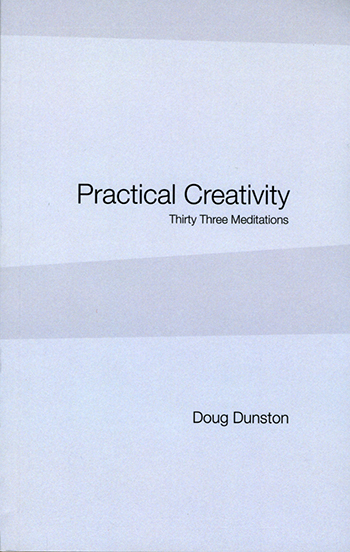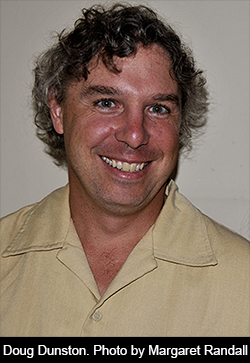
In numerous postings, the New Mexico Mercury has commented on the great number of brilliant and creative Albuquerque residents, capable of turning our city’s uniqueness into prosperous livability—if only our urban structures and political machinations allowed us to make real use of such talent. Doug Dunston, who is Professor of Music at New Mexico Tech but lives in Albuquerque, is one such extraordinary mind. His new book, Practical Creativity (self-published, available from Amazon.com) displays that mind with disarming candor. A modest book, of only 72 pages, it is one of those reads that moves quickly but draws us back again and again, to contemplate the deep wisdom in both text and image.
 Dunston has subtitled his book Thirty Three Meditations. I read them as poems, but that may be because I am a poet and think of poetry as the most distilled and concise expressive form, at least in literature. Dunston’s designation as Professor of Music doesn’t give us a clue as to his range of talents. I have seen him conduct the Albuquerque Philharmonic, a profoundly moving experience. He teaches such courses as Failure, Change and Integrity; Practical Creativity; and Interdisciplinary Problem Solving, which should give some idea of his provocative range. He has a unicycle hidden away in his garage. And he owns and frequently flies a tiny experimental plane.
Dunston has subtitled his book Thirty Three Meditations. I read them as poems, but that may be because I am a poet and think of poetry as the most distilled and concise expressive form, at least in literature. Dunston’s designation as Professor of Music doesn’t give us a clue as to his range of talents. I have seen him conduct the Albuquerque Philharmonic, a profoundly moving experience. He teaches such courses as Failure, Change and Integrity; Practical Creativity; and Interdisciplinary Problem Solving, which should give some idea of his provocative range. He has a unicycle hidden away in his garage. And he owns and frequently flies a tiny experimental plane.
It was from the open window of his plane that he took the haunting picture of Valle Caldera, that serves as the book’s frontispiece. The lay of the land, at once voluptuous and mysterious, sets an anticipatory mood for the meditations to come. Practical Creativity includes several other pages of interesting gray-scale graphics, featuring different combinations of small circles on a grid. You would have to hold the book in your hands to appreciate how perfectly these images compliment the texts.

Practical Creativity opens with the following meditation, or poem:
To reach an end, to solve a puzzle,
there are times you must go backwards
Remove the goal
leave wonder
play and exploration
Keeping the goal
why not keep wonder?
though it may take longer,
or you may not arrive
Without keeping wonder
you may fail to reach the goal anyway
and it will have been quite a dull time
When traveling in a foreign land
it is best to have with you
some feeling of being at home
When at home
it is best to have
some feeling of traveling in a foreign land
Certainly more than an aphorism, perhaps a poem, a meditation in the description of its author, these words took root in me from first reading. As I made my way through the book, I was struck by the care with which Dunston made his decisions of what to include and what to leave out. The silences are often as loud as the words. Each meditation made me wonder if it might not have started out as a brief essay or part of a lecture in one of his classes. I easily imagined the author trimming his own sentences until what remains is absolutely essential.
I’ll transcribe one more page:
When Children play,
their goal (if you call it that)
is to be playing
Practice and play
are very much alike
This is language shaved to its essence, thought reduced to simple but luminous truth. I urge you to buy this small book and enjoy it as much as I have.



Responses to “Doug Dunston’s Mind: “Practical Creativity””